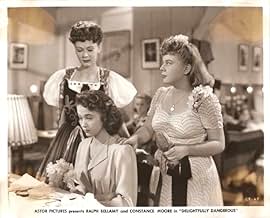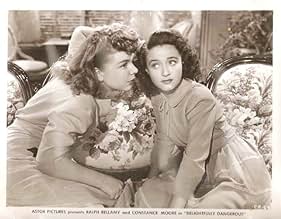IMDb RATING
6.0/10
393
YOUR RATING
Teen Sherry Williams dreams of a singing career and idolizes her sister Josephine, who performs in New York. Encouraged by false stories about her sister from a Broadway producer. when Sherr... Read allTeen Sherry Williams dreams of a singing career and idolizes her sister Josephine, who performs in New York. Encouraged by false stories about her sister from a Broadway producer. when Sherry pays a surprise visit to New York.Teen Sherry Williams dreams of a singing career and idolizes her sister Josephine, who performs in New York. Encouraged by false stories about her sister from a Broadway producer. when Sherry pays a surprise visit to New York.
Sunny Burkette
- Cathy Gahagan
- (uncredited)
Chester Conklin
- Passerby at Burlesque Theatre
- (uncredited)
Mike Donovan
- Burlesque House Patron
- (uncredited)
Christian Drake
- Jimmy Burns
- (uncredited)
Edward Earle
- Roberts - Butler
- (uncredited)
Bess Flowers
- Mrs. Hopkins
- (uncredited)
Jack Gargan
- Burlesque House Patron
- (uncredited)
Eddie Hall
- Marine Sergeant Dancing with Jo
- (uncredited)
Earle Hodgins
- Burlesque Barker
- (uncredited)
Featured reviews
Jane Powell thinks her sister, Constance Moore, is starring on Broadway. Producer Ralph Bellamy confirms this to her classmates at her posh school. When she goes to New York to visit, she discovers the truth: Miss Moore is starring in burlesque. Meanwhile, Bellamy is unable to cast his new show, a swing version of Strauss as arranged by Morton Gould.
Except for the burlesque connection -- alas, the camera cuts away before we get to see the good stuff -- this looks a lot like a Deanna Durbin musical from the late 1930s, with Miss Powell standing in for Miss Durbin. Miss Powell gets to sing a number of songs in a variety of styles, and Miss Moore cuts loose a couple of time, especially with the big finale, which is a lot of fun; the staging suggests R. Strauss' DIE FLEDERMAUS more than Johann Strauss, but that's fine. Miss Powell shortly went to MGM, where she played this sort of role for several years; Miss Moore appeared in several movies for a couple more years, often in a specialty number; and Bellamy made one more movie that year, then was not seen on the big screen for a decade.
It's the type of story that was often done better for Miss Durbin, and clearly didn't serve anyone's career. Director Arthur Lubin stages the musical numbers pretty stodgily; even if they are set in a theater stage or where Morton Gould's orchestra is playing, there's little sense of the visual fantasy that most movie musicals provided.
Except for the burlesque connection -- alas, the camera cuts away before we get to see the good stuff -- this looks a lot like a Deanna Durbin musical from the late 1930s, with Miss Powell standing in for Miss Durbin. Miss Powell gets to sing a number of songs in a variety of styles, and Miss Moore cuts loose a couple of time, especially with the big finale, which is a lot of fun; the staging suggests R. Strauss' DIE FLEDERMAUS more than Johann Strauss, but that's fine. Miss Powell shortly went to MGM, where she played this sort of role for several years; Miss Moore appeared in several movies for a couple more years, often in a specialty number; and Bellamy made one more movie that year, then was not seen on the big screen for a decade.
It's the type of story that was often done better for Miss Durbin, and clearly didn't serve anyone's career. Director Arthur Lubin stages the musical numbers pretty stodgily; even if they are set in a theater stage or where Morton Gould's orchestra is playing, there's little sense of the visual fantasy that most movie musicals provided.
Plug Powell's bouncy effervescence into a generator and the sky would light up. At times she's a little much, but as an aspiring teenage singer, she really lights up the screen. Now, if she can just get the vocal career she wants and turn sister Moore from a burlesque queen into a legitimate stage performer, she'll be happy. Meanwhile, big-time stage producer Bellamy gets to stand around and look handsomely important. All together, they make an engaging threesome.
For sure, director Lubin keeps things moving, while the choreographed musical numbers are imaginative eye-catchers. Too bad the songs are forgettable even with the renowned Morton Gould conducting. Note the fringe presence of all the lively servicemen as the big war winds down in the production year of 1944. And for those interested in ladies' fashions of the time, there's plenty, especially with the stately Moore modeling. Then too, is that the great W. C. Fields doing a quick grab-by in the rolling record scene. It passes quickly, but see what you think.
Anyway, it's a fast moving, if not particularly memorable musical, that showcases a teenage Powell clearly on her way up the movie ladder.
For sure, director Lubin keeps things moving, while the choreographed musical numbers are imaginative eye-catchers. Too bad the songs are forgettable even with the renowned Morton Gould conducting. Note the fringe presence of all the lively servicemen as the big war winds down in the production year of 1944. And for those interested in ladies' fashions of the time, there's plenty, especially with the stately Moore modeling. Then too, is that the great W. C. Fields doing a quick grab-by in the rolling record scene. It passes quickly, but see what you think.
Anyway, it's a fast moving, if not particularly memorable musical, that showcases a teenage Powell clearly on her way up the movie ladder.
This light musical is solid if nothing special, with a story, characters, and production that are all about average overall. The cast is probably the strongest part if it, with a young Jane Powell in the lead role.
The story concerns two sisters and their dreams of a career in show business. As the younger of the two, Powell's character wants to be a singer, and Powell is given several opportunities to perform. As her sister, Constance Moore has a simpler role, but she fulfills it adequately. Ralph Bellamy probably gives the best performance, and he is well-cast as a well-meaning, slightly befuddled Broadway producer. Arthur Treacher also pitches in playing Bellamy's butler.
Most of the rest of it is rather plain, although there are no real flaws. The story is purely lightweight, but it has enough to keep you watching, and the characters are just believable enough to make you care about them.
The story concerns two sisters and their dreams of a career in show business. As the younger of the two, Powell's character wants to be a singer, and Powell is given several opportunities to perform. As her sister, Constance Moore has a simpler role, but she fulfills it adequately. Ralph Bellamy probably gives the best performance, and he is well-cast as a well-meaning, slightly befuddled Broadway producer. Arthur Treacher also pitches in playing Bellamy's butler.
Most of the rest of it is rather plain, although there are no real flaws. The story is purely lightweight, but it has enough to keep you watching, and the characters are just believable enough to make you care about them.
Poor plot, dire music, amateurish dancing, but surprisingly likable overall! The screenplay is quite witty and the acting in the minor parts is excellent. Better directed and photographed than most musicals of this type the time passes quite nicely. Watch for amusing cameos by stalwarts Arthur Treacher and Louise Beavers. There are a number of glaring inconsistencies and holes in the plot. Morton Gould, surely the least charismatic band leader ever to star in and write the music for a musical, plays just the sort of dull symphonic schmaltz that is apparently holding back the prospects of Arthur Hale's new production, while Josephine's shocking burlesque act shows a great deal less leg than her interminable number in a legitimate play at the end of the film.
The very talented Jane Powell was a delightful and enjoyable actress, especially in her string of musicals from the mid-1940s to late 1950s. But, this was just her second film, and a loan-out from MGM with much lesser quality material than MGM would provide for her. She doesn't have the wonderful musicians, top actors, writers and material here that were just around the corner for her at MGM. Those would make her star shine brightly in some wonder musical comedies and romance films.
There isn't even much music or comedy here. The best is the school's annual production in which a number of skits - song and dance routines are performed in a carnival setting. The performers appear as mannequins who come to life to sing and dance when a carnival patron shoots the bulls-eye for their skit. It's an original sort of arrangement that is quite good. But the rest of the film has very little music and just a couple brief scenes with slight comedy Arthur Treacher and Louse Beavers provide most of the comedy as Jeffers and Hannah.
There is one little aside for Ralph Bellamy fans. This is one film in which Bellamy gets a girl. In most films with Cary Grant and a host of leading men in which he plays second fiddle, Bellamy always loses out to the more handsome hero.
Of all of the musical comedies and romance films that Jane Powell made, only one was a real dud - "Athena" in 1954. This film is the only other one that isn't at least very good. And she made some great ones.
There isn't even much music or comedy here. The best is the school's annual production in which a number of skits - song and dance routines are performed in a carnival setting. The performers appear as mannequins who come to life to sing and dance when a carnival patron shoots the bulls-eye for their skit. It's an original sort of arrangement that is quite good. But the rest of the film has very little music and just a couple brief scenes with slight comedy Arthur Treacher and Louse Beavers provide most of the comedy as Jeffers and Hannah.
There is one little aside for Ralph Bellamy fans. This is one film in which Bellamy gets a girl. In most films with Cary Grant and a host of leading men in which he plays second fiddle, Bellamy always loses out to the more handsome hero.
Of all of the musical comedies and romance films that Jane Powell made, only one was a real dud - "Athena" in 1954. This film is the only other one that isn't at least very good. And she made some great ones.
Did you know
- TriviaJane Powell wrote in her memoirs that Ralph Bellamy "said time and time again, 'That was the worst movie I ever made.' And I'm inclined to agree... I didn't know it wasn't a good film. I had a good time making it." Powell says Morton Gould was "miserable" during filming because he had never made a movie before and was very self conscious.
- ConnectionsEdited into Your Afternoon Movie: Delightfully Dangerous (2023)
Details
- Release date
- Country of origin
- Language
- Also known as
- Delightfully Dangerous
- Production company
- See more company credits at IMDbPro
Box office
- Budget
- $875,000 (estimated)
- Runtime1 hour 32 minutes
- Color
- Aspect ratio
- 1.37 : 1
Contribute to this page
Suggest an edit or add missing content

Top Gap
By what name was Délicieusement dangereuse (1945) officially released in India in English?
Answer































